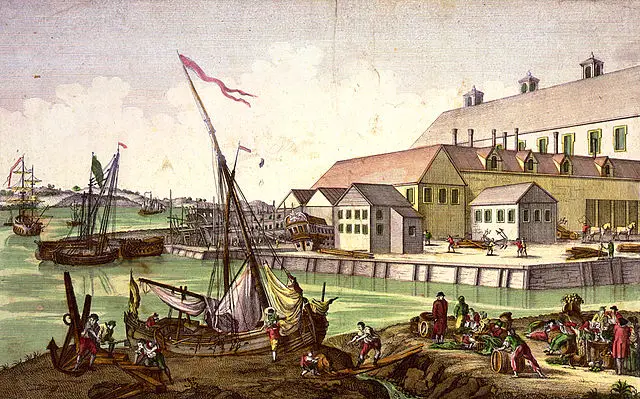British Products
The British had a strong economy, and one of the reasons that they did was through mercantilism. The economy got more robust because of the imports and exports that Britain had.
Britain had some of the best products that could be used, and they would trade with other countries such as Spain, Portugal, France, and other places.
Colonies
One of the problems with Britain was that they relied strongly on the resources that the colonies had, and because of this, they made restrictions on how the colonies could trade their products and how they could spend their money.
Trade
It was during this time that trade becomes restricted, and this caused the freedom and the growth of the colonies to slow down.
In 1660, England passed a law called the Acts of Trade and Navigation. This was a set of laws that made the colonies have to depend more on the items that Britain had.
There were laws made that only certain goods could be sold, such as sugar, cotton, indigo, iron, fur, sugar, and more.

Slave Trade
During this time, trade was big a big thing, but so was slavery. In the colonies, the slaves were needed to make sure that goods were grown, and that work was done on the plantations and the farms.
There were a lot of products that other countries wanted, such as cotton, rum, molasses, and sugar. These things would be traded to Britain in exchange for slaves.
Taxes
The British government made a rule on trading silver and gold. Britain was about to go to war, and they needed to have money to help pay for the war, and so they had to put taxes on items that the colonies wanted to trade, and this hurt the colonies too.
War
After the Seven Years’ War had happened, Britain spent a lot of money on its armies, and so they had to put extra taxes on things to cover the money.
Some of the taxes were a Cider tax, a Sugar Tax, a Tea Tax, and more. Britain thought that the colonies were not paying enough taxes, and these taxes caused the colonies to not be able to afford to sell their items and to make a living for their families.
The taxes were extremely bad for small farm owners and for business owners that were poor and middle class.
Sugar Act
The Act of 1764 was the American Duties Act or the Sugar Act. This was a law where the colonists would have to pay extra money any time that they decided to sell molasses.
Stamp Act
Another tax that the British government made was the Stamp Tax. This was where people in the colonies would have to pay money on each piece of paper that was used. This meant that each newspaper, each court document, and each letter that had to be stamped was charged extra money.
As the colonies grew, this ended up costing them a lot of money.
Facts About British Products:
- British taxation ended up being one of the reasons for the Revolutionary War.
- The colonies traded things such as fish, whale products, timber, furs, beer, whiskey, livestock, copper, horses, maple syrup, and other products to Britain and around the world.
- Trade was one of the biggest ways that the colonies made money.
- Trade was good for the colonies because they were close to the sea, and they could take boats across the countries for trading.
- The New England colonies had a hard time growing crops, but they were great at fishing and hunting.
- Middle Colonies such as Pennsylvania and New York were great at growing things, and so they had fruits and vegetables for trade.
- The southern colonies such as North Carolina and Maryland were known for their forests, so they loved to trade tobacco, rice, dye, lumber, and furs.
What Did You Learn?
Why was Britain a strong place?
Britain was strong because it had a strong economy, and it had a good mercantilism or trade system.
Who did Britain trade with?
Britain traded with countries all over the world, and even more, they traded with the colonies.
Why did Britain need money?
Britain needed money because they had spent a lot of money on war.
What did Britain do to get the money?
Britain set up a taxation system that was taxing people for trading and for using certain products.
What were some of the taxes that Britain had other countries, including the colonists, to pay?
The colonists and other countries had to pay a Sugar Tax, a Stamp Tax, and more.
What did all of the taxing eventually lead to?
The taxing eventually leads to the Revolutionary War.



